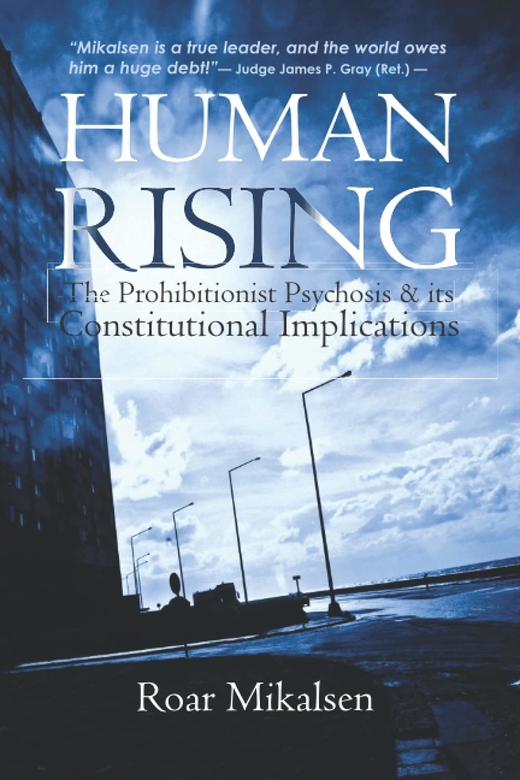
Author Roar Mikalsen has crafted a powerful argument against totalitarian thinking, the war on drugs, and other ills of a broken society in Human Rising: The Prohibitionist Psychosis and its Constitutional Implications. The title may be a mouthful, but this is a fascinating dive into the historical precedent, policy, and liberation from the prohibitionist mindset.
Beginning with a psychological and philosophical foundation for the status quo, and explaining how the masses are controlled with relative ease through a multifaceted strategy of fear and scarcity, the author wastes no time in reminding readers that they’re living in a carefully controlled construct. Just when you expect the prose to veer into conjecture or conspiracy, the prose turns instead to the real-world facts of drug policy over the past century in various parts of the world, and comments on the similarities in reasoning – religion, political power, intentional division of demographics, and the like.
Perhaps the most eye-opening section focuses on the control, manipulation, and even facilitation of drug markets by world powers. Again, without slipping into unproven claims or outlandish theories, the author unravels a complex network of influence, deceit, and corruption. Pulling from powerful quotes, transcripted interviews, countless textbooks, legal cases, and a staggering amount of peer-reviewed research, this book makes bold accusations, but also brings the receipts, so to speak. The effort required to compile and craft a book like this demonstrates Mikalsen’s unwavering purpose to shine a light on the current state of the world.
There are usually firm divisions between academic writing, journalistic reporting, and opinion-driven narrative, but Mikalsen moves through these styles smoothly, imbuing the entire text with subtle passion and emotional appeals to reason. The table of contents reads like a history or social science textbook, but the prose is laced with charged and compelling language that is far from the sterile phrasing of an academic report. This occasional informality and obvious dedication to the subject is effective, and doesn’t undercut Mikalsen’s authority, given how carefully he researched and penned every line of this text.
Though written in 2018, the book’s message resonates even more powerfully in 2021, as prohibition seems alive and well in the world’s social, political, and even athletic realms. Notably, this book highlights the intersectionality of crises in a way that feels prophetic, and it’s likely that this content will only become more relevant as time goes on. The section focusing on the United States is particularly disturbing, as it highlights how the ongoing US war on drugs has only deepened crises in the country, while wasting billions in resources and further oppressing historically excluded populations.
On a technical level, the prose is nearly perfect, with clearly cited references, consistent formatting, grammatical accuracy, and a dearth of wasted words. Some of the historical details may lose readers due to the exhaustive nature of the research, and the footnote-heavy sections near the end of the book are somewhat less fluid than others, but this is a minor criticism. Those readers who make it that far will already be invested and absorbed in the subject, and will likely appreciate the deeper explications.
In sum, this is a masterfully written book that everyone should read, particularly those who seek to break out of the current paradigms and oppressive systems of thought in order to achieve a more liberated way of life.
Book Links
STAR RATING
Design
Content
Editing
Get an Editorial Review | Get Amazon Sales & Reviews | Get Edited | Publish Your Book | Enter the SPR Book Awards | Other Marketing Services






















Thank you very Much for this excellent review. I could not be happier for your Words and your courage. God bless❤️